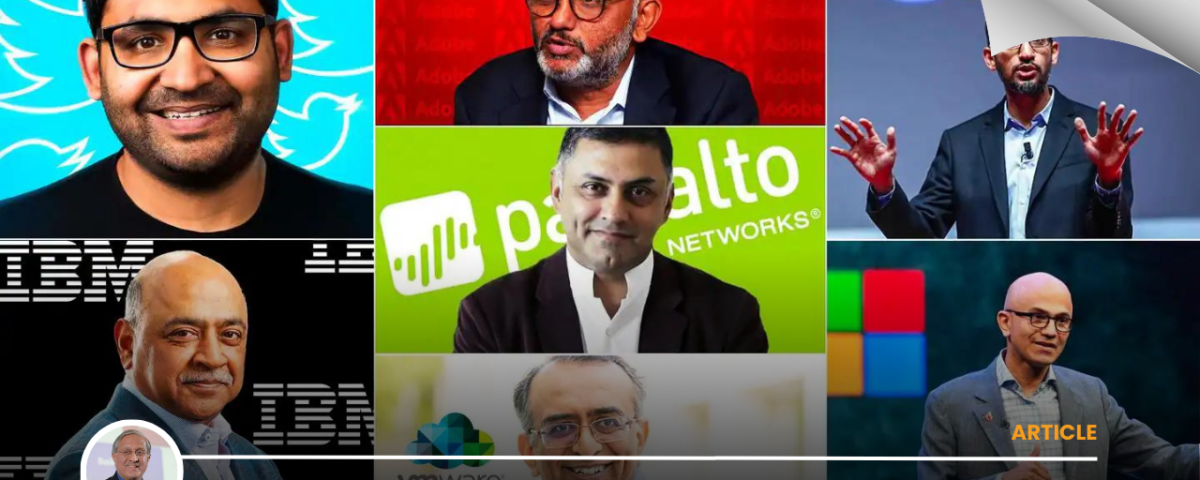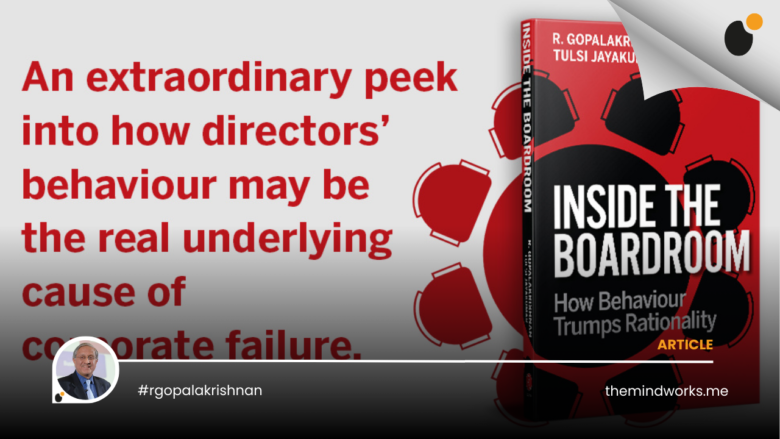TNIE (19)
To appear on 6-1-22
‘Transforming organizations’: a series in New Indian Express.
When the CEO really matters
R Gopalakrishnan*
(*The writer’s latest book title, “Pivots for Career Success—unleashing people power”, coauthored with R Srinivasan, has just been published. He was Director of Tata Sons and Vice Chairman of Hindustan Unilever).
Email: rgopal@themindworks.me
The short answer is ‘matters a lot’, if the chosen leader is unfiltered, and ‘matters a tad less’, if the chosen leader is a product of fine filtration.
Over the last eighteen columns, I have written about vital and relevant aspects concerning organizational transformation and institution building, both of which are driven by three imperatives, one, the pace of change in the company’s industry; two, how urgent it is for the organization to respond; and three, the choice of the leader who has to implement the transformation program.
Does the company need major organizational change? If yes, how does the board identify the ideal leader who can successfully supervise to make the transition? Does an individual leader matter at all, or is it the organizational momentum and history that determines outcomes? Do circumstances create individual leaders or do individual leaders make their own circumstances? Answers to these questions define who is an unfiltered or filtered leader.
Lately I have been reading several books on leadership talent. The Rare Find by George Anders was on talent in sports, and how exceptional talent makes a dramatic difference. The book has anecdotes on how coaches wagered successfully on a player despite contrarian indicators. The Master by Christopher Clarey is the ‘official’ biography of tennis star, Roger Federer. It describes episodes when several talent spotters decided to back Federer despite doubts on whether he was a top-class, exceptional tennis player.
However, for determining leadership in a company, how can a board decide who might make an exceptional leader? Indispensable, by Prof Gautam Mukunda of HBS, is enlightening. The contents resonate with my own experiences in Unilever and Tata. What does Prof Mukunda narrate from his research?
There are companies that practice a well-honed LFS, which stands for “Leadership Filtration System”. For example, HUL has an explicit process to identify talent and groom managers for future roles of leadership. No wonder HUL churns out leaders so frequently. Its system filters out the odd ball, seemingly eccentric manager. After a fruitful service record in the organization, candidates for the top job emerge.
Filtered leaders tend to resemble each other. Obviously, they are not identical, even though they have passed through the same filters. Recall how in 1981, Reginald Jones, GE Chairman, selected his successor when Jack Welch was selected. Or 2002, when Jack Welch set up a process to select Jeff Immelt from internal candidates. From an external perspective, it could be argued that it really did not matter which of the internal candidates was selected because they all had the potential to be equally successful CEOs.
In HUL, from an outsider’s perspective, Prakash Tandon was selected in preference to Kalyan Sunder Basu, or Ashok Ganguly over Susim Datta. There were obviously good reasons for the selections. But to be fair, either of the aspirers, could have done a correspondingly top-class job. In short, LFS candidates, according to Prof Mukunda, tend to be interchangeable. They represent the median of the talent pool in a company, where the median is quite rich because of the efficiency of the filtration system.
The HUL patten though is an exception in corporate India. Indeed, even in HUL, T Thomas could be considered as an unfiltered leader, because for some years in between, he had left to join his family company. At a senior level, he arguably escaped the rigorous LFS of HUL. When Thomas was recruited back by HUL, perhaps it was because he was a lateral thinker with different ideas. The condition of HUL at the time of his selection as chairman was life-threatening. A major portion of the company portfolio was under severe price controls; the government wanted to reduce foreign shareholding to 40% or less; worker unions were very militant. Such external circumstances made it imperative to identify a leader with unconventional ideas, which Thomas had in plenty. Thomas was a very successful CEO. He could be thought to be an unfiltered leader.
In the year 2005, the Unilever global board desired a dramatic change in the global organization’s unwieldy structure. For the first time, Unilever recruited an external CEO in Paul Polman, who turned out to be an unqualified success.
In Tata, talent management was within the domain of individual Tata companies. Tata Steel, Tata Consultancy and Titan have a well-developed talent filtration system; for many decades, managers advanced from among those who had passed through the internal filtration system. Long-time insiders become potential candidates for the top job, and, finally, one was selected from among very close candidates.
This was not so when it came to the group. Group leaders changed rarely. When JRD Tata appointed his successor in 1991 after fifty-two years of his own chairmanship, Ratan Tata became the fifth chairman in 120 years. There was no rigorous system of internal talent filtration at the group level. Anyway, changes in group leadership were rare. Almost every appointment involved selection of an unfiltered leader, including the appointment of JRD himself in 1939, followed by the choice in the 1970s, of Minoo Mody from AF Ferguson as the first CEO of Tata Sons.
I feel confident that when I was appointed in 1998 as an executive director of Tata Sons, I was perceived as an unfiltered leader in the group, though Ishaat Hussain must have been seen as a filtered executive director. Ratan Tata’s successor, Cyrus Mistry, was clearly an unfiltered leader within the Tata group. That succession did not end well. Chandra is far more a product of the intensive TCS LFS.
In future articles, I propose to explore whether any rules can be set on the slippery subject of CEO selection. These rules can be applied and tested: in other private sector companies, in PSUs, in family businesses, and even in political institutions.



